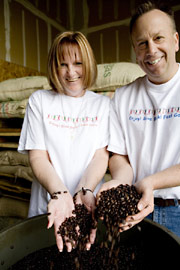Small coffee company takes âfair tradeâ one step further
Posted: 4/13/07
| Roastmaster Matt MacBride moves freshly roasted beans through a cooling pan at the Beneficio Coffee Co. in Sacramento, Calif. (RNS PHOTOS/Max Whittaker) |
Small coffee company takes
‘fair trade’ one step further
By Joanna Corman
Religion News Service
SACRAMENTO, Calif.—For the 15 years that Tom Angus worked for a company that negotiated the lowest possible prices for coffee beans, he occasionally would travel to Costa Rica, meet with farmers and hear about their desperate poverty and how they were losing their land.
Angus insists he was able to remain “mentally disconnected” from the poverty he saw.
Yet on Sunday mornings, when his pastor at Pioneer Congregational Church here would talk about living out one’s faith, something would nag at him.
By 2003, Angus could no longer ignore that nagging feeling and quit his job.
 |
| Tom Angus and Jinxi Allen founded Beneficio Coffee Co. in 2004. The company takes the Fair Trade coffee model one step further by giving part of its profits back to the communities where the coffee beans are harvested. |
In May 2004, with his friend and fellow church member Betty “Jinxi” Allen, Angus started Beneficio Coffee, a Sacramento-based importing and roasting company.
But rather than adopt the Fair Trade model that guarantees a fair price for coffee growers, the pair wanted to go further.
Most Fair Trade companies buy coffee from grower’s cooperatives for $1.26 a pound; Beneficio pays $1.39, plus a separate wage for coffee processors.
After deducting its expenses, Beneficio channels 20 percent of its proceeds back to the farming communities, and sends an additional 10 percent to a charity of the buyer’s choice.
And because the company bills itself as “more than Fair Trade,” it has opted not to pay 10 cents a pound for a Fair Trade label from a certifying organization.
Instead, it gives that money directly to the farmers.
“It makes you think when you’re picking up that cup what your choices are and how much of a blessing it is, and how much work goes into that simple daily pleasure that is so cheap for us, but literally decides someone’s future,” Angus said.
So far, most of Beneficio’s customers are churches, but it also sells to schools, service organizations, small companies and individuals over the Internet. The company is nearly at the break-even point, Allen and Angus say, and they are working on lining up investors.
Beneficio—which means “benefit for all” in Spanish—is part of a growing movement of for-profit companies for which social and environmental gains are as important as profits.
Stephen Hamilton, a retired United Church of Christ pastor in Portland, Ore., who makes presentations about Beneficio at churches nationwide, says buying coffee from a socially responsible company lets him be faithful to God.
“From a mission point of view, from a theological, spiritual point of view, if there’s violence in the world then we seek to correct the violence,” he said. “What we’re doing by our choice of purchasing coffee is helping (the farmers) to be more self-reliant but not depend upon any other organization to be able to do that.”
In 2004 and 2005, the company gave $16,900 to the farmers and to groups in the United States. Some of that money bought uniforms and supplies for children in Costa Rica, allowing some to attend school for the first time, and a year’s worth of lunches for 55 orphans.
John Sage, co-founder and president of Pura Vida Coffee, a for-profit Fair Trade company in Seattle, said it’s plausible for small companies that have strong relationships with their customers and growers to shun the Fair Trade label.
“You can very reasonably say we know we do as good or a better job in terms of ensuring economic opportunities and environmental stewardship and so we don’t need the mark,” he said.
So far, Beneficio has sold roughly 37,000 one-pound bags of its “heavenly blend” coffee for $6.25 each—a miniscule slice of the nation’s $11 billion specialty coffee market.
Still, the company is making a big difference to the families on the ground, said Gilbert Ramirez, international operations manager for CoopeAgri R.L., a Costa Rican coffee grower’s cooperative that processes Beneficio’s coffee.
“Beneficio is the only company that gives back money to the coffee farmer in this region,” he said. “Beneficio Coffee opened our eyes because it’s a new way to make a business.”
News of religion, faith, missions, Bible study and Christian ministry among Baptist churches, in Texas, the BGCT, the nation and around the world.



